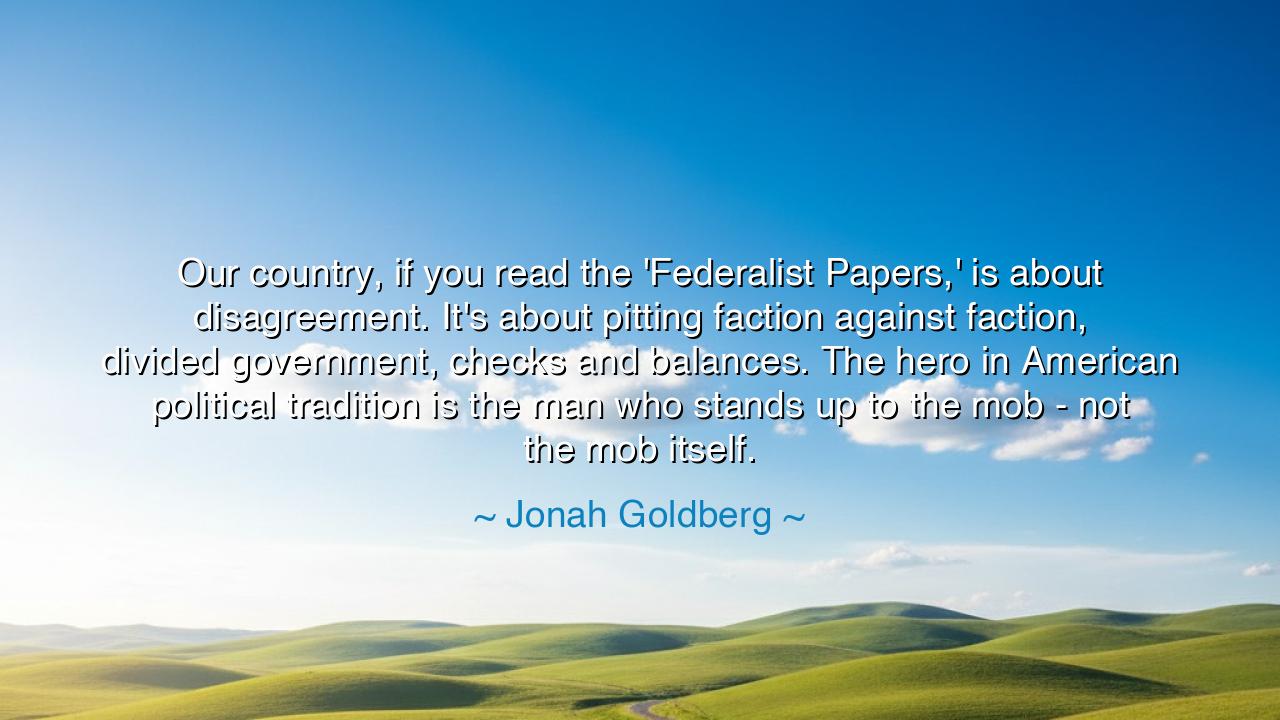
Our country, if you read the 'Federalist Papers,' is about
Our country, if you read the 'Federalist Papers,' is about disagreement. It's about pitting faction against faction, divided government, checks and balances. The hero in American political tradition is the man who stands up to the mob - not the mob itself.






"Our country, if you read the 'Federalist Papers,' is about disagreement. It's about pitting faction against faction, divided government, checks and balances. The hero in American political tradition is the man who stands up to the mob – not the mob itself." – Jonah Goldberg
In these stirring and perceptive words, Jonah Goldberg reminds us of a truth as ancient as democracy itself: that freedom thrives not in harmony, but in honest conflict; not in unanimity, but in the tension of opposing forces. His reflection calls us back to the founding vision of the United States—a nation built not on the illusion of agreement, but on the wisdom of constraint. When Goldberg speaks of “pitting faction against faction,” he recalls the deliberate architecture of the Founding Fathers, who understood that human passions, left unchecked, would consume liberty itself. Thus, they built a government not to silence disagreement, but to channel it into order and justice.
The origin of this quote lies in the very spirit of the Federalist Papers, those profound essays written by Alexander Hamilton, James Madison, and John Jay to defend the newly drafted Constitution. In Federalist No. 10, Madison argued that factions—groups of citizens driven by their own interests—were inevitable, for they arose from the nature of man. The solution was not to destroy them, but to balance them through a system of divided powers. Goldberg’s insight is that this design was not a flaw, but a genius. The Founders understood that liberty survives only when no single faction, no passing passion, can dominate the rest. In this way, disagreement itself becomes the guardian of freedom.
Yet Goldberg’s words also sound a warning for our own age, when the mob—that ancient enemy of reason—rises once again in many forms. The mob is not merely a crowd of people; it is a state of mind, a surrender of thought to emotion, of conscience to rage. In every generation, it reappears, whether in the streets or on the screens, demanding conformity and punishing dissent. Against this force, Goldberg exalts not the popular, but the courageous—the one who dares to stand alone against the multitude. For in the American tradition, the hero is not the voice that echoes the crowd, but the soul who resists it for the sake of truth.
History has shown us the cost and glory of such courage. Think of John Adams, who, though a patriot of the Revolution, defended the British soldiers accused in the Boston Massacre because he believed in the rule of law above the fury of the mob. “Facts are stubborn things,” he said, and he risked his reputation to uphold them. Or recall Abraham Lincoln, who, in an age of division and violence, refused to yield to either extreme, guiding his nation through civil war with both conviction and mercy. These were men who stood, as Goldberg says, not with the mob but against it—men who knew that the crowd’s anger, though loud, is not the voice of justice.
Goldberg’s invocation of checks and balances is more than political philosophy—it is moral philosophy. It teaches that restraint is strength, and that balance is the foundation of freedom. The Founders designed a republic where no branch could overpower the others, just as no citizen should dominate his fellows. It is a system built on humility—the recognition that no man, no party, no ideology possesses the whole truth. To honor this balance is to practice the highest form of civic virtue: the discipline to listen, to debate, and to seek common ground without surrendering one’s principles.
Yet, to live by these principles is never easy. The temptation to join the mob—to find comfort in anger and belonging—is powerful. It demands little courage to shout with the crowd; it demands great courage to stand in silence against it. Goldberg’s words call us to remember that true heroism lies in independence of thought, in defending the unpopular truth, in speaking reason to passion even when the world sneers. For democracy, like fire, is a good servant but a terrible master. Only when reason governs emotion can liberty endure.
The lesson, then, is this: disagreement is not a disease of democracy—it is its heartbeat. The danger lies not in division, but in the surrender of conscience to collective rage. The mob may roar, but it cannot reason; the hero listens to his own conscience and stands firm when others falter. The strength of a free society is measured not by the volume of its crowds, but by the courage of its individuals.
And so, the practical actions are these: cherish debate, even with those who oppose you. Defend the rights of those with whom you disagree, for in doing so, you defend your own. Read the Federalist Papers, and understand the genius of a system built to restrain both power and passion. Above all, have the courage to stand when others rush blindly forward, and to speak when silence seems safe. For as Jonah Goldberg reminds us, the true hero of a republic is not the mob—it is the one who, standing alone, guards liberty against the clamor of the crowd.






AAdministratorAdministrator
Welcome, honored guests. Please leave a comment, we will respond soon